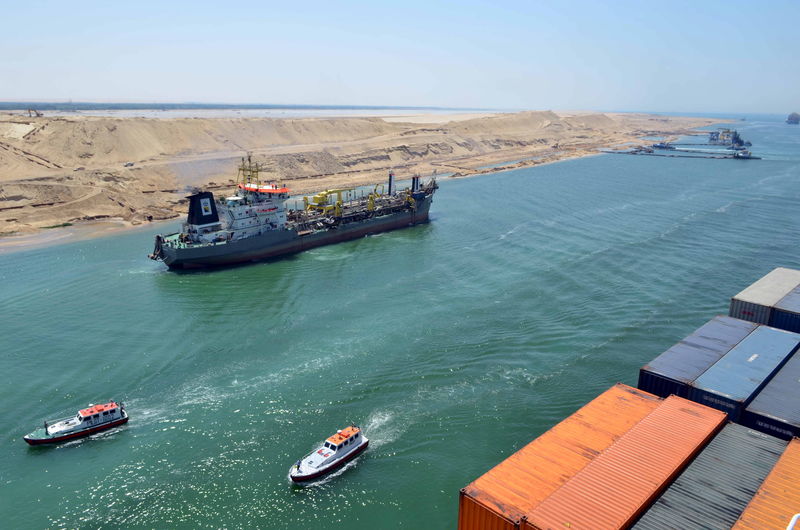Investing.com - After the US and UK attacks on Houthi targets in Yemen, tensions in the Red Sea have risen. The risk is that clashes in an area crucial for maritime traffic will severely damage global trade, triggering a new inflation flare-up. However, according to Schroders (LON:SDR), the situation is quite different from what happened during the Covid period, when blockades in the supply chain caused prices to rise and prompted central banks to raise interest rates.
No one passes through the Red Sea any more
"Satellite images show that virtually no ships bound for major European, US or UK ports are passing through the Red Sea, preferring instead to divert to southern Africa," says David Rees, senior emerging markets economist at Schroders.
'This latest disruption,' he recalls, 'follows problems in the Panama Canal, where a combination of climate change-induced drought and El Nino-induced rainfall variations have caused water levels to drop. At the same time, in Europe, the humidity has resulted in the Rhine level, a key shipping route for German producers, being too high. In addition, the upcoming elections in Taiwan carry the risk of new military exercises by China, such as those that disrupted Asian shipping lanes in 2022'.
In short, it seems that global supply chains face a perfect storm full of risks.
Will inflation rise again?
All this evokes painful memories: the supply chain problems that erupted during the Covid-19 pandemic. 'They,' explains Rees, 'contributed to the recent rise in inflation, which ultimately forced the world's central banks to aggressively raise interest rates. Markets are currently discounting aggressive interest rate cuts in Europe, the UK and the US, and some cuts are already expected in the first half of 2024'.
All this leads to the question of whether the new supply chain problems will imply a rise in inflation, forcing policymakers to revisit the relative outlook.
"Much will depend on the duration of the current upheavals," the expert points out. However, he adds, 'at least three important differences in the global economic environment suggest that the problems in the Red Sea are unlikely to lead to a significant rise in inflation.
First, demand conditions are currently much weaker. "While ample monetary and fiscal stimulus has supported the global economy after the initial disruptions caused by the global pandemic, growth is currently slowing," notes Rees. "We expect global GDP growth of just 2.5 per cent this year and next. The Eurozone is probably already in recession, the UK is experiencing some weakness, and activity in the US is showing a cooling'.
Secondly, 'while lockdowns to contain the spread of Covid-19 caused demand to be concentrated in the goods sector during the pandemic, consumption patterns are now much more balanced'. In fact, reasons the expert, 'the reopening of economies has resulted in demand shifting back to services over the past two years, leaving the global manufacturing sector in recession'.
Thirdly, according to the analyst, the global economy is also in much better shape on the supply side. 'Whereas, during the pandemic, production was completely halted due to lockdowns that were imposed and then removed, there are no such disruptions now. Diversions around southern Africa will lengthen delivery times, but goods will still reach their destination, suggesting that real shortages are unlikely. Moreover, China's recent trade data, which show that exports are growing much faster in volume than in value, suggest that companies, at least in some sectors, are being forced to discount prices to dispose of excess capacity'.
But there is no shortage of risks
A more immediate risk to headline inflation would arise if tensions in the Middle East start to affect commodity supply, in particular by driving up energy prices. In particular, Schroders assumes in one of its scenarios that, "in addition to trade frictions, a widening of tensions in the region could push oil prices up towards USD 120 per barrel".
In this case, the manager predicts that the global economy would move towards stagflation, "as rising energy costs would drive up inflation, with the risk of second-round effects (given the rigidity of labour markets) weighing on growth, forcing central banks to forego rate cuts and perhaps even further hikes".
However, Rees points out, 'so far, oil prices have performed satisfactorily and crude oil has remained broadly unchanged at just under USD 80 per barrel'.
At the moment, therefore, danger averted. In any case, concludes the Schroders economist, who emphasises the need to reorganise global supply chains, 'the latest hiccup in transport routes is yet another reminder of the risks associated with long supply chains in an increasingly fragmented world.
Translated from Italian using DeepL.
________________________________________________________
Want to start using InvestingPro? Here is a small gift from us! Enjoy an extra 10% discount on the 1 or 2 year plans. Hurry up not to miss the New Year’s sale! You can save almost 60%!
Follow this link for the 1-year plan with your personal discount,
or click here for the full 2-year plan with 60% off!
